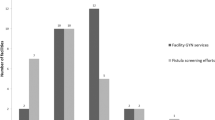Abstract
Objective
Obstetric fistula is a devastating childbirth injury that leaves women incontinent, stigmatized and often isolated from their families and communities. In Ethiopia, although much attention has focused on treating and preventing obstetric fistula, other more prevalent childbirth-related pelvic floor disorders, such as pelvic organ prolapse, non-fistula-related incontinence and post-fistula residual incontinence, remain largely unattended. The lack of international and local attention to addressing devastating pelvic floor disorders is concerning for women in low- and middle-income countries. The objective of this article is to highlight the need for a more comprehsive approach to pelvic floor care and to share our experience in addressing it.
Methods
Here, we share our experience launching one of the first formal training programs in Female Pelvic Medicine and Reconstructive Surgery (FPMRS) in Ethiopia.
Results
This fellowship program provides quality care while strengthening the health system in its local context. This program has positioned Ethiopia to be a regional leader by providing comprehensive training of surgeons and allied health professionals, building appropriate health system and research infrastructure, and developing a formal FPMRS training curriculum.
Conclusion
We hope that sharing this experience will serve as a template for others championing comprehensive pelvic floor care for women in low- and middle-income countries.

Similar content being viewed by others
References
Campaign to End Fistula Now Active in 30 Countries | UNFPA - United Nations Population Fund. https://www.unfpa.org/press/campaign-end-fistula-now-active-30-countries. Accessed 4 Jan 2019.
Ballard K, Ayenachew F, Wright J, Atnafu H. Prevalence of obstetric fistula and symptomatic pelvic organ prolapse in rural Ethiopia. Int Urogynecol J. 2016;27:1063–7. https://doi.org/10.1007/s00192-015-2933-0.
Maheu-Giroux M, Filippi V, Samadoulougou S, Castro MC, Maulet N, Meda N, et al. Prevalence of symptoms of vaginal fistula in 19 sub-saharan africa countries: a meta-analysis of national household survey data. Lancet Glob Heal. 2015;3:e271–8. https://doi.org/10.1016/S2214-109X(14)70348-1.
Wright J, Ayenachew F, Ballard K. The changing face of obstetric fistula surgery in Ethiopia. Int J Womens Health Volume. 2016;8:243–8. https://doi.org/10.2147/IJWH.S106645.
Islam RM, Oldroyd J, Karim MN, Hossain SM, Md Emdadul Hoque D, Romero L, et al. Systematic review and meta-analysis of prevalence of, and risk factors for, pelvic floor disorders in community-dwelling women in low and middle-income countries: a protocol study. BMJ Open. 2017;7:1–6. https://doi.org/10.1136/bmjopen-2016-015626.
Ghetti C, Skoczylas LC, Oliphant SS, Nikolajski C, Lowder JL. The emotional burden of pelvic organ prolapse in women seeking treatment: a qualitative study. Female Pelvic Med Reconstr Surg. 2015;21:332–8. https://doi.org/10.1097/SPV.0000000000000190.
Lowder JL, Ghetti C, Nikolajski C, Oliphant SS, Zyczynski HM. Body image perceptions in women with pelvic organ prolapse: a qualitative study. Am J Obstet Gynecol. 2011;204:441.e1–5. https://doi.org/10.1016/J.AJOG.2010.12.024.
Dunivan GC, Anger JT, Alas A, Wieslander C, Sevilla C, Chu S, et al. Pelvic organ prolapse. Female Pelvic Med Reconstr Surg. 2014;20:322–7. https://doi.org/10.1097/SPV.0000000000000077.
Laganà AS, La Rosa VL, Rapisarda AMC, Vitale SG. Pelvic organ prolapse: the impact on quality of life and psychological well-being. J Psychosom Obstet Gynecol. 2018;39:164–6. https://doi.org/10.1080/0167482X.2017.1294155.
Murray C, Goh JT, Fynes M, Carey MP. Urinary and faecal incontinence following delayed primary repair of obstetric genital fistula. BJOG An Int J Obstet Gynaecol. 2002;109:828–32. https://doi.org/10.1016/S1470-0328(02)00124-6.
Goh JTW, Krause H, Tessema AB, Abraha G. Urinary symptoms and urodynamics following obstetric genitourinary fistula repair. Int Urogynecol J. 2013;24:947–51. https://doi.org/10.1007/s00192-012-1948-z.
Wall LL. Residual incontinence after obstetric fistula repair. Obstet Gynecol. 2016;128:943–4. https://doi.org/10.1097/AOG.0000000000001734.
Siddle K, Vieren L, Fiander A. Characterising women with obstetric fistula and urogenital tract injuries in Tanzania. Int Urogynecol J. 2014;25:249–55. https://doi.org/10.1007/s00192-013-2185-9.
Browning A. Risk factors for developing residual urinary incontinence after obstetric fistula repair. BJOG An Int J Obstet Gynaecol. 2006;113:482–5. https://doi.org/10.1111/j.1471-0528.2006.00875.x.
Kopp D, Tang J, Bengtson A, Chi B, Chipungu E, Moyo M, et al. Continence, quality of life, and depression following surgical repair of obstetric vesicovaginal fistula: a cohort study. BJOG An Int J Obstet Gynaecol. 2018. https://doi.org/10.1111/1471-0528.15546.
Wall LL, Arrowsmith SD, Lassey AT, Danso K. Humanitarian ventures or “fistula tourism?”: the ethical perils of pelvic surgery in the developing world. Int Urogynecol J. 2006;17:559–62. https://doi.org/10.1007/s00192-005-0056-8.
Gjerde JL, Rortveit G, Adefris M, Belayneh T, Blystad A. Life after pelvic organ prolapse surgery: a qualitative study in Amhara region, Ethiopia. BMC Womens Health. 2018;18:74. https://doi.org/10.1186/s12905-018-0568-2.
Kruk ME, Gage AD, Arsenault C, Jordan K, Leslie HH, Roder-DeWan S, et al. High-quality health systems in the sustainable development goals era: time for a revolution. Lancet Glob Heal. 2018;6:1196–252. https://doi.org/10.1016/S2214-109X(18)30386-3.
Acknowledgements
We thank the following organizations that have made this work possible: Worldwide Fistula Fund, Hamlin Fistula Ethiopia, Hamlin Fistula USA, Mekelle University, OHSU’s Footsteps to Healing Global Women’s Health Initiative, Ethiopian Ministry of Health and Education, Tigray Regional Health Bureau, Tigray Women’s Association, Healing Hands of Joy, and various faculty from partner academic institutions and organizations who volunteered their time to teach.
Author information
Authors and Affiliations
Corresponding author
Ethics declarations
Conflicts of interest
The fellowship program is funded by Worldwide Fistula Fund, Hamlin Fistula Ethiopia, Hamlin Fistula USA and Oregon Health & Science University Footsteps to Healing Global Women’s Health Initiative. Dr. Yibrah Berhe and Dr. Renate Roentgen get small salary support from the partners. Drs. Rahel Nardos, Christopher K Payne and Theresa Spitznagle are board members of Worldwide Fistula Fund, Dr. L. Lewis Wall is founder and consultant to Worldwide Fistula Fund, and Dr. Karen Gold is a board member of Hamlin Fistula USA.
Additional information
Publisher’s note
Springer Nature remains neutral with regard to jurisdictional claims in published maps and institutional affiliations.
Rights and permissions
About this article
Cite this article
Nardos, R., Ayenachew, F., Roentgen, R. et al. Capacity building in female pelvic medicine and reconstructive surgery: Global Health Partnership beyond fistula care in Ethiopia. Int Urogynecol J 31, 227–235 (2020). https://doi.org/10.1007/s00192-019-04197-0
Received:
Accepted:
Published:
Issue Date:
DOI: https://doi.org/10.1007/s00192-019-04197-0



